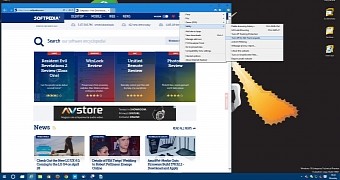After years of fighting against advertisers and offering Do Not Track turned on by default in Internet Explorer 10 and 11, Microsoft is ready to make a sudden change in Windows 10 and disable this feature by default in the brand new Spartan browser.
In a blog post detailing the decision to disable Do Not Track in Windows 10, Microsoft says that the World Wide Web Consortium (W3C) has since changed the text of its rules regarding the way users are tracked when browsing the web.
“Key to that notion of expression is that the signal sent MUST reflect the user’s preference, not the choice of some vendor, institution, site, or network-imposed mechanism outside the user’s control; this applies equally to both the general preference and exceptions,” Microsoft wrote, quoting a new draft proposed by W3C.
“The basic principle is that a tracking preference expression is only transmitted when it reflects a deliberate choice by the user. In the absence of user choice, there is no tracking preference expressed.”
“We didn't change our mind”
Microsoft says that, since it has been one of the main supporters of Do Not Track turned on by default in Windows browsers, the company hasn't changed its mind. Instead, the firm is now trying to provide a better way to handle sites that do not honor Do Not Track and choose to ignore it, even if enabling the setting was users' choice.
But right now, Microsoft adds, these websites consider that users didn't enable Do No Track on purpose and ignore the signal, pointing out that the browser developer instead turned on this feature by default without users' consent.
In Windows 10, there will be clear guidance on how to turn on this feature in Spartan browser to make sure that users who want to avoid getting tracked when browsing the web can be protected. Microsoft says that the change will take place on new PCs, but also on PCs that upgrade from a previous version of Windows.

 14 DAY TRIAL //
14 DAY TRIAL //